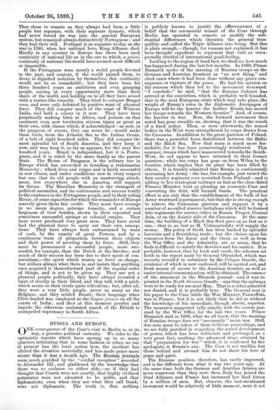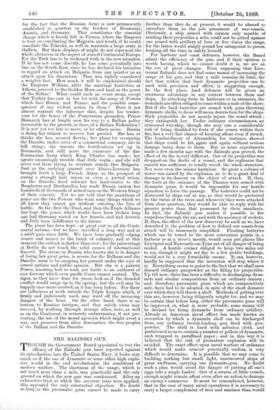RUSSIA AND EUROPE.
ONE consequence of the Czar's visit to Berlin is, in its way, a genuine political curiosity. We refer to the optimistic reports which have sprung up in so many quarters intimating that in some fashion or other, no one at present has the least notion how, the incident has altered the situation materially, and has made peace more secure than it was a month ago. The Russian journals seem much gratified by the " cordial reception " accorded to Alexander III., and gladdened by the knowledge that there was no coolness on either side,—as if they had thought that Courts were not courtly, that highly civilised potentates were not educated to be polite, and that diplomatists, even when they are what they call frank, were not diplomatic. The truth is, that nothing is publicly known to justify the effervescence of a belief that the ceremonial transit of the Czar through Berlin has operated to remove or modify the sub- stantial differences which threaten the general tran- quillity and called the Triple Alliance into being. But this is plain enough,—though, for reasons not explained, it has been thought expedient to represent that visit as unex- pectedly fruitful of international good-feeling. Looking to the region of hard fact, we shall see how much has happened during the last few months. In 1888, Prince Bismarck spoke of the massing of Russian troops on the German and Austrian frontiers as " no new thing," and cited cases where it had been done without any grave con- sequence or rupture of the peace. He had his opinion on the reasons which then led to the movement westward. " I conclude," he said, " that the Russian Cabinet has arrived at the conviction, which is probably well founded, that in the next European crisis which may take place, the weight of Russia's voice in the diplomatic Areopagus of Europe will be the heavier the farther Russia has moved her troops towards the Western frontier." And, of course, the heavier in war. Now, the forward movement then noted has gone steadily on, showing that it was the result of a fixed policy. Then, or soon afterwards, the armed bodies in the West were strengthened by corps drawn from the Caucasus. In addition to the great garrison of Poland, there was a powerful force distributed between the Baltic and the Black Sea. Now that mass is much more for- midable, for it has been perseveringly reinforced. This summer, troops which have manoeuvred towards the South- West, do not appear to have returned to their former quarters ; while one corps has gone on from Wilna to the frontier, which implies that its place has been filled by others. It is frankly admitted that Russia is continuously increasing her Army—she has, for example, just raised the first cavalry regiment ever recruited from Finland—and is adding to her strategical railways as fait as the close-fisted Finance Minister, bent on pleasing an economic Czar and converting the debt, will furnish funds. The practical effect is not only that the establishment of the bulk of her Army westward is permanent, but that she is strong enough to restore the Caucasian garrison and support it by a number of so-called reserve battalions which will be formed into regiments for service either in Russia Proper, Central Asia, or on the Asiatic side of the Caucasus. At the same time, the building of a Black Sea fleet goes on as fast as it can,—that is, as fast as M. Vishnegradsky will supply the money. His policy of thrift has been backed by splendid harvests and a flourishing trade ; but the claims upon his resources from the Amur and the Oxus, as well as from the War Office and the Admiralty, are so many, that he finds it difficult to satisfy the Services and his master. It is probable, however, that by hook and crook, the schemes set forth in the report made by General Obrutchef, which was recently revealed in substance by the Cologne Gazette, the existence of which is now confessed, will be carried out, and fresh means of access to the Austrian frontier, as well as easier internal communication, will be obtained. The essence of the statement in the Rhenish journal—and it was re- printed in the North German Gazette—was that the railways were to be ready for use next May. That is neither admitted nor denied, and it is probably true. The General sent in his paper to the Czar, while the War Minister, Vannoffski, was in France ; but it is not likely that he did so without the knowledge of his immediate, though absent, superior. The measures suggested tally exactly with the course pur- sued by the War Office for the last two years. Prince Bismarck said in 1888, what we all know, that the massing of Russian troops does not " necessarily " mean war. Stilt, due note must be taken of these bellicose proceedings, and we are fully justified in regarding the actual development of power, which has been deliberate and prolonged, as a very great fact, marking the advanced stage attained by that " preparation for war" which, it is confessed by her apologists, is Russia's aim. The Czar is not warlike, but those behind and around him do not share his love of peace and quiet. The Russian position, therefore, has vastly improved, and is far different from what it was two years ago. At the same time, both the German and Austrian Armies are more numerous than they were then, Italy has joined the Dual Alliance, and France has increased her land forces by a million of men. But, observe, the last-mentioned increment would be relatively of little moment, were it not for the fact that the Russian Army is now permanently established in quarters on the borders of Roumania, Austria, and Germany. That constitutes the essential change which is keenly felt in Vienna, where the Emperor is bent on conciliating the Magyars, and would, if he could, conciliate the Tchecks, as well as maintain a large army in Gallicia. But these displays of might do not represent the whole alteration in the aspect of armed Continental Europe. For the Turk has to be reckoned with in the new situation. If he has not come directly, he has come potentially into line on the South-East, since he has declared his intention to regard an attack on Bulgaria from any quarter as an attack upon his dominions. That was tightly considered a weighty fact. How much it will be emphasised should the Emperor William, after the marriage festivities at Athens, proceed to the Golden Horn and land as the guest of the Sultan ! What could such an event mean, except that Turkey has cast in her lot with the array of Powers which face Russia and France, and the possible conse- quences of any violent action by them ? Does it not almost warrant the inference that, despite his tender- ness for the bones of the Pomeranian grenadier, Prince Bismarck has at length seen his way to a Balkan policy favourable to the growth, in time, of a Balkan Federation ? It is not yet too late to move, or let others move. Russia is doing her utmost to recover lost ground. She has, or thinks she has, secured Servia ; her plans for occupying the Danube, under cover of a commercial company, are in full swing ; she resents the fortifications set up in Roumania, and still more the existence of the fine Roumanian Army which King Charles has made ; her agents unceasingly trouble that little realm ; and she will never rest from trying to overturn sturdy, free Bulgaria. Just as the undying quarrel over Alsace-Lorraine has brought forth a huge French Army, so the prospect of seeing a strongly knit union, or even a partial union, on the Danube, fixed athwart her land-routes to the Bosphorus and Dardanelles, has made Russia canton her hundreds of thousands of armed men on the Western fringe of their country. Yet we are told that the guardians of peace are the two Powers who want some things which we all know they cannot get without entering the lists of battle. So far, first the Dual, and then the Triple Alliance has kept the peace, which would have been broken long ago had Germany rested on her laurels, and had Austria and Italy been indifferent to the future.
The peace has been kept—at great cost to all the Conti- nental nations—but we have travelled a long way and at a swift pace since 1886. We have been gradually edging nearer and nearer to the brink of calamity, and at this moment the outlook is darker than ever ; for the palaverings at Berlin do not touch the solid causes of international discord. The stress on Russia, who knows she is in danger of losing her great prize, is severe, for the Balkans and the Danube seem to be escaping her pursuit under the aegis of armed nations and public opinion. But she is a patient Power, knowing how to wait, yet liable to an outburst of race fervour which even pacific Czars cannot control. The signs, as they have done for years, look as if the dreaded conflict would surge up in the spring ; but the evil may be happily once more averted, as it has been before. For there are influences at work outside the Triple League which, if firmly and judiciously used, may ward off the menacing dangers of the hour. On the other hand, there is no bottom to Russian intrigue, and that subtle virus may succeed, by working through strange allies, here, as well as on the Continent, in seriously embarrassing, if not pre- venting, the use of the moral agencies which might avert a war, and preserve from alien domination the free peoples o7 the Balkan and the Danube.







































 Previous page
Previous page